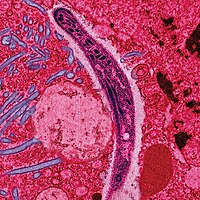
Behavioural adaptations of mosquito vectors to insecticide control.
Sign Up to like & getrecommendations! Published in 2019 at "Current opinion in insect science"
DOI: 10.1016/j.cois.2019.03.005
Abstract: Behavioural resistance to insecticides may be an important factor restraining the efficacy of vector control against mosquito-transmitted diseases. However, our understanding of the mechanisms underlying such behavioural resistance remains sparse. In this review, we focus… read more here.
Keywords: vectors insecticide; insecticide control; behavioural adaptations; adaptations mosquito ... See more keywords

Mechanisms of Plasmodium-Enhanced Attraction of Mosquito Vectors.
Sign Up to like & getrecommendations! Published in 2017 at "Trends in parasitology"
DOI: 10.1016/j.pt.2017.08.010
Abstract: Evidence is accumulating that Plasmodium-infected vertebrates are more attractive to mosquitoes than noninfected hosts, particularly when high levels of gametocytes are present. Changes in host odour have been suggested as a likely target for parasite… read more here.
Keywords: mechanisms plasmodium; mosquito vectors; plasmodium enhanced; enhanced attraction ... See more keywords

Toxicity of Ulva lactuca and green fabricated silver nanoparticles against mosquito vectors and their impact on the genomic DNA of the dengue vector Aedes aegypti
Sign Up to like & getrecommendations! Published in 2022 at "IET Nanobiotechnology"
DOI: 10.1049/nbt2.12082
Abstract: Abstract Marine seaweeds are known to have a potential role against microbial and pesticidal activities. Ulva lactuca, a green macroalgae extract analysed through gas chromatography mass spectrometry reveals 31 compounds. Resistance of mosquito vectors to… read more here.
Keywords: aedes aegypti; mosquito vectors; silver; silver nanoparticles ... See more keywords

Comparison of Landmark- and Outline-Based Geometric Morphometrics for Discriminating Mosquito Vectors in Ratchaburi Province, Thailand
Sign Up to like & getrecommendations! Published in 2018 at "BioMed Research International"
DOI: 10.1155/2018/6170502
Abstract: It is often challenging to identify mosquito vectors in the field based on morphological features due to their similar morphologies and difficulties in obtaining undamaged samples but is required for their successful control. Geometric morphometrics… read more here.
Keywords: outline based; geometric morphometrics; mosquito vectors; landmark outline ... See more keywords

Intra-Host Diversity of Dengue Virus in Mosquito Vectors
Sign Up to like & getrecommendations! Published in 2022 at "Frontiers in Cellular and Infection Microbiology"
DOI: 10.3389/fcimb.2022.888804
Abstract: Dengue virus (DENV) is the most common arbovirus, causing a significant burden on both the economy and global healthcare systems. The virus is transmitted by Aedes species of mosquitoes as a swarm of closely related… read more here.
Keywords: diversity; dengue virus; virus; mosquito vectors ... See more keywords

Arboviruses and the Challenge to Establish Systemic and Persistent Infections in Competent Mosquito Vectors: The Interaction With the RNAi Mechanism
Sign Up to like & getrecommendations! Published in 2019 at "Frontiers in Physiology"
DOI: 10.3389/fphys.2019.00890
Abstract: Arboviruses are capable to establish long-term persistent infections in mosquitoes that do not affect significantly the physiology of the insect vectors. Arbovirus infections are controlled by the RNAi machinery via the production of viral siRNAs… read more here.
Keywords: persistent infections; mosquito vectors; rnai; silencing vectors ... See more keywords

Biological Control Strategies for Mosquito Vectors of Arboviruses
Sign Up to like & getrecommendations! Published in 2017 at "Insects"
DOI: 10.3390/insects8010021
Abstract: Historically, biological control utilizes predatory species and pathogenic microorganisms to reduce the population of mosquitoes as disease vectors. This is particularly important for the control of mosquito-borne arboviruses, which normally do not have specific antiviral… read more here.
Keywords: vectors arboviruses; mosquito vectors; control; strategies mosquito ... See more keywords

Molecular Identification and phylogenetic analysis of mosquito vectors from Mananthavady Taluk, Wayanad, Kerala, India
Sign Up to like & getrecommendations! Published in 2023 at "Journal of Vector Borne Diseases"
DOI: 10.4103/0972-9062.361166
Abstract: Background & objectives: Every year more than one billion people are infected and about one million people die from vector-borne diseases; of which mosquito-borne diseases remain as the world’s most severe insect-borne diseases with excessive… read more here.
Keywords: kerala; mosquito vectors; taluk wayanad; mananthavady taluk ... See more keywords

Consumption of endemic arbovirus mosquito vectors by bats in the southeastern United States
Sign Up to like & getrecommendations! Published in 2022 at "Journal of Vector Ecology"
DOI: 10.52707/1081-1710-47.2.153
Abstract: ABSTRACT: Mosquitoes affect human health and well-being globally through their roles as disease-causing pathogen vectors. Utilizing genetic techniques, we conducted a large-scale dietary study of three bat species common to the southeastern U.S.A., Lasiurus seminolus… read more here.
Keywords: mosquito vectors; bat; mosquito; arbovirus mosquito ... See more keywords